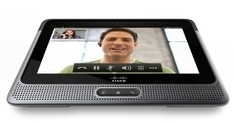Cisco Launches Enterprise Android Tablet

Cisco plans to give businesses a mobile platform for collaboration with its new Cius tablet
Cisco Systems is unveiling an Android-based tablet PC designed as a mobile communications and collaboration platform for businesses.
At its Cisco Live event yesterday in Las Vegas, company officials showed off the Cisco Cius, the latest addition to a growing collaboration portfolio that includes WebEx, telepresence and Quad.
The Cius is being designed to give businesses a lightweight mobile device that will integrate with all of those Cisco collaboration technologies and be managed by Cisco’s Unified Communications Manager software and offer enterprise-level security.
Opening up Android to the enterprise
It also opens up another avenue through which businesses and their employees can access the growing Android application store, and will help expand that selection of applications by giving developers Cisco collaboration application programming interfaces (APIs) through a software developer kit (SDK).
Cius is part of Cisco’s larger Borderless Networks initiative, which is designed to create an environment that enables users to access the internet at any time from anywhere using any device.
The tablet is the latest example of how business collaboration is changing, according to Tony Bates, senior vice president and general manager of enterprise, commercial and small business at Cisco.
 “This platform can transform how health care professionals advance patient care; how retailers deliver service experiences to consumers; or how universities deliver world-class education to their students,” Bates said in a statement. “Best of all, Cisco Cius offers IT functions a way to dramatically lower the cost per user of provisioning those new experiences.”
“This platform can transform how health care professionals advance patient care; how retailers deliver service experiences to consumers; or how universities deliver world-class education to their students,” Bates said in a statement. “Best of all, Cisco Cius offers IT functions a way to dramatically lower the cost per user of provisioning those new experiences.”
Not everyone sees the usefulness of such a device. Van Baker, an analyst with Gartner, said he could see how a device like Cius would play well in the consumer market, but its practical business application isn’t clear.
“If it’s for an enterprise’s use, I’m having a hard time figuring out why they would want to use this tablet as opposed to a notebook with a good, integrated webcam,” Baker said in an interview.
There are some instances where it could prove worthwhile, he said, such as if an engineer is working on a project and wants to use the Cius for its video conferencing capabilities. However, in everyday enterprise life, most workers can get the same or similar experience that the Cius offers from a laptop with a good webcam running Windows, Baker said.
The consumer market is different, he said. Consumers are more willing to give up some functionality for ease of use. But not so in the enterprise.
The Cius – which will be going out for customer trials in the third quarter, with general availability in the first quarter of 2011 – features a 720p high-definition (HD) front-facing camera, a 7-inch high-resolution screen and a single button for telepresence interoperability.
The device also makes it easy for users to find their contacts, offers an accelerometer that orients applications for portrait or landscape modes, and will have wide wireless support for 802.11 a/b/g/n WiFi and 3G, with 4G capabilities coming later.
The battery offers up to right hours of life under normal use, and the Cius comes with an optional HD audio station that includes a telephone handset speakerphone, HD DisplayPort and USB ports.
Cisco officials also said because the tablet can be used in a virtual desktop environment, it can help drive down corporate operating expenses and be integrated with cloud computing environments.
The Cius is the latest move by Cisco to meet a growing demand for consumer technology in the business world. At a telepresence conference held to unveil the Cisco Quad enterprise social networking offering, company officials said there is a strong and growing trend of integrating consumer products – such as the Apple iPad, Skype voice over IP (VoIP) and Cisco Flip video camera – into the corporate space.
Tablet PCs have been around for many years, but it wasn’t until Apple launched its iPad this year that the market appears to be taking off. A host of other vendors, including Dell, are bringing their own tablets to the market.